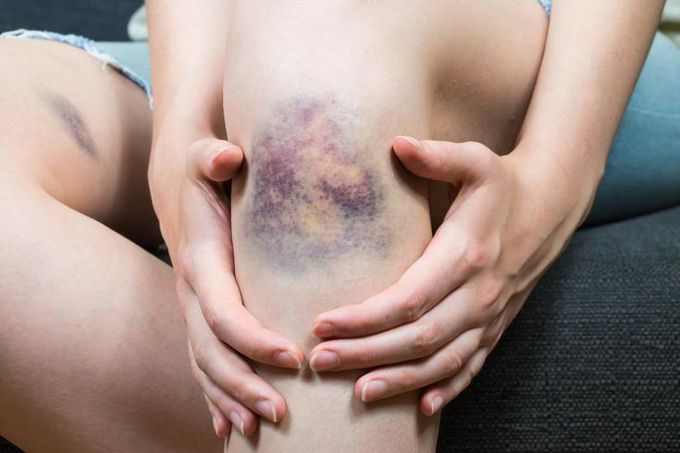


ECCHYMOSIS
Have you found a purple mark somewhere on your body? It could be ecchymosis. That's the medical term for a type of bruise. This dark purple spot forms on your skin when blood leaks out of your blood vessels into the top layer of your skin. It's usually from an injury, and it’s 1/2 inch long or bigger. A bruise or two on your arms or legs is usually nothing to worry about. Bruises on your belly, back, or face with no obvious cause, or many new bruises, are reasons to see your doctor. Causes If you've ever bumped your arm or leg with enough force on a hard surface, you know how bruises form. The hit or fall breaks blood vessels just under your skin's surface. If the injury causes a cut in your skin, you bleed. When there is no cut, the blood can't get out, so it pools underneath your skin. Blood cells called platelets rush to the injury. They combine with proteins called clotting factors to form a clot. The clot plugs the broken blood vessel and stops it from bleeding. A single bruise on your skin is often a symptom of a minor injury. Up to half of Americans bruise easily, sometimes without any obvious cause. Women tend to bruise more than men do. So do older adults. As you age, your skin thins and loses its fatty protective layer, as well as collagen and elastin supporting the blood vessels, which leads to more bruises. Problems with platelets, blood clotting factors, or blood vessels can cause ecchymosis, too. Easy bruising could also be a sign of a bleeding disorder such as hemophilia or Von Willebrand disease. You may notice more bruises than usual if you take medicines that thin your blood or affect its ability to clot, such as: NSAIDs like aspirin, ibuprofen, or naproxen Blood thinners like clopidogrel (Plavix), heparin, and warfarin (Coumadin) Antibiotics Certain antidepressants Supplements such as ginkgo, ginseng, fish oil, garlic, and vitamin E Steroids If you take one of these drugs and you've noticed bruises, check with your doctor. But don't stop taking any medicine before you talk to them. These are a few other causes of bruises: Liver or kidney disease Problems with your bone marrow, which makes new blood cells Not getting enough vitamins such as B12, C, or K Connective tissue disease such as Ehlers-Danlos syndrome or lupus Alcohol misuse Cancer HIV and other infections Symptoms Ecchymosis turns the skin a dark purple color. As the bruise heals, it may turn green, yellow, or brown. The bruise symptoms you're probably familiar with include: Pain over the bruise Tenderness when you press on it Swelling Signs that your bruises could be from a bleeding disorder, rather than an injury, are: Trouble stopping the bleeding when you cut yourself Frequent nosebleeds Heavy or very long periods Red or purple spots on your skin Diagnosis Your doctor will examine your skin and the bruises. Expect to answer questions about: Your overall health What medicines you take Whether anyone in your family has a bleeding or clotting disorder What you were doing when the bruises appeared A blood test can help your doctor find the cause of ecchymosis. Tests can find abnormal blood cells or too few of the platelets that normally help your blood clot. You may need to have other tests if your doctor suspects that liver disease, cancer, or another condition caused your bruises. Treatment If a minor injury like a bump caused your ecchymosis, the mark should clear up within a week or two. Hold ice to the bruise a few times a day for the first day or two. If your bruising is due to age, your doctor may suggest that you avoid medicines like NSAIDs that could make you bleed more easily. Which treatment you might need depends on the cause of your bruises. Your doctor has medicines for liver and kidney disease, HIV, and cancer. If a drug caused ecchymosis, you may need to stop taking it or change medicines. Taking supplements can correct a vitamin deficiency. If you bleed a lot, you may need to get fluids through a vein or a blood transfusion. Platelet transfusions treat a low platelet count. When to See Your Doctor A bruise that pops up from time to time or after you've injured yourself is no reason to worry. But see a doctor if you have: Several bruises with no obvious cause A bruise that doesn't go away in a week or two A possible injury like a broken bone that caused the bruise Bleeding that doesn't stop after a few minutes Signs of too much blood loss, such as weakness, dizziness, nausea, or extreme thirst Also call your doctor if you recently had surgery or gave birth and you notice bruises or bleeding.
Living with Lupus is often a battle not just against the illness itself, but also against the emotional weight of uncertainty, fatigue, and the toll of long-term medications. For one courageous woman, that battle began in 2013. Diagnosed after Lupus had already affected her joints and internal organs, she was quickly placed on medication that initially helped. But as time went on, her health declined again this time with more frequent flare-ups and increasingly difficult side effects. Like many others with chronic illness, she faced the crushing weight of hopelessness. Each day became harder than the last, and conventional treatments no longer offered the comfort they once did. But in March 2020, at her lowest point, she made a decision that changed everything.Out of desperation and with a healthy dose of skepticism she turned to NaturePath Herbal Clinic, hoping their natural Lupus treatment might offer at least some relief. What happened next went far beyond her expectations.After completing a six-month herbal program, her flare-ups stopped entirely. Her energy returned. The chronic pain that had defined her daily life began to fade. For the first time in years, she felt like herself again. Not just alive but truly living.Her story is not just one of healing; it’s one of resilience, open-mindedness, and the courage to try something new when all else fails. By sharing her journey, she hopes to offer something priceless to others living with Lupus: hope.This treatment has been a true breakthrough for her. If you’re searching for a safe, natural, and effective alternative, I genuinely recommend giving this a chance.”www.naturepathherbalclinic.com or email them at info@naturepathherbalclinic.com


